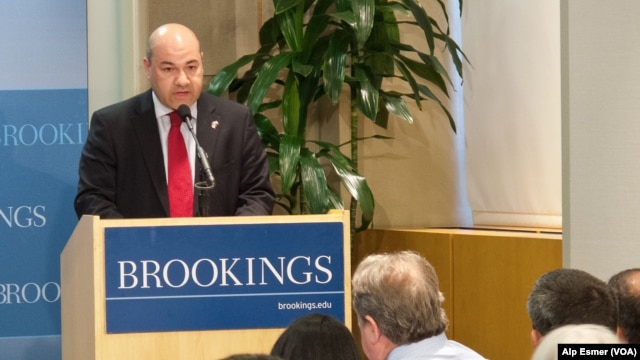
FILE - Lukman Faily, Iraq's Ambassador to Washington, speaking at the Brookings Institute, Sep. 18, 2013
The Iraqi ambassador to the United States told VOA in an interview with the Persian News Network that his country is going to ask Russia for help in dealing with al-Qaida insurgency.
One week has passed since al-Qaida militants raised their flag over government buildings in Fallujah and declared an independent Islamic state.
The White House has called on Congress to help provide aid to Iraq as soon as possible.
And while Iraq appreciates current U.S. counterterrorism support, the Iraqi ambassador to the U.S., Lukman Faily says the government is turning to Russia for military equipment while the U.S. Congress deliberates President Barack Obama's latest request.
"We are under no obligation to work with only one partner, whether it's Iranians, or Americans or Russians or French," Faily said.
U.S. lawmakers have blocked approval of delivering Apache helicopters for months. The lawmakers first want assurances the aid will not be used against Iraqi civilians in the politically-divided nation. They also want to see Prime Minister Nouri al-Maliki stop allowing Iranian deliveries of military aid to Syria using Iraqi airspace.
Faily counters that his country cannot prevent the influx of fighters entering Syria from Iraq.
"If people go to some other country and then go to Syria, we can't control that. But let's put it this way: has the government supported it? No," he said.
He told VOA he believes Iraq's position on Syria has remained more consistent than that of any other country in the Middle East.
"We don't want to be a party to more violence in Syria and we know the Syrian situation, our brothers, they have to have a political process," he said. "We don't want to go and change regimes all over the place. That's not our job."
Republican Party leaders, from House Speaker John Boehner to Senator John McCain, have criticized Obama's policies on both sides of the Syria-Iraq border. Boehner said Thursday the president has not been sufficiently engaged on Iraq, instead designating those responsibilities to Vice President Joe Biden. The White House has rejected that critique. Boehner did not offer specifics on his criticism.
|
|
